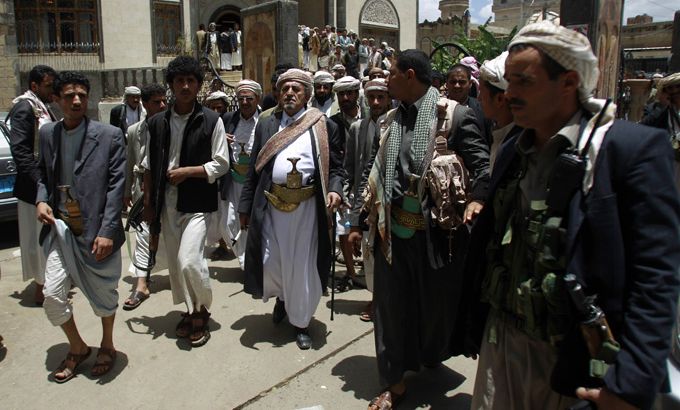Saleh orders rival tribal chief’s arrest
Yemeni president calls for arrest of key rival as government forces and tribal fighters engage in deadly battles.

Yemeni President Ali Abdullah Saleh has ordered the arrest of a dissident tribal chief, Sheikh Sadiq al-Ahmar, following a night of deadly clashes in the capital, Sanaa, between fighters loyal to the two men.
In a statement issued on Thursday, Yemen’s defence ministry said Saleh had ordered that al-Ahmar and nine brothers be brought to justice for “for armed rebellion”.
Dozens of people were killed in overnight gun battles in Sanaa, while the defence ministry said at least 28 people were killed in an explosion at an arms storage area.
A government official said that the headquarters of an opposition television station had been “destroyed”, without giving details.
Sheikh Sadiq al-Ahmar is the leader of the Hashed tribe, which includes Saleh’s tribe, and has been a vocal opponent of the president, joining protesters in calling for him to leave power.
Speaking to Al Jazeera on Thursday, al-Ahmar said that clashes were ongoing near the Sanaa airport, and that it might be closed.
He also said that the mediation to end the violence was over and he urged Arab countries to pressure Saleh to leave.
His men have captured about 70 members of Yemeni security forces, he said, and they will declare a cease fire once Saleh’s forces stop fighting.
Resident’s flee
Mohammed al-Qadhi, a Yemeni journalist in Sanaa, told Al Jazeera that the situation in the city was becoming increasingly tense.
“The government is saying that there was an explosion at an arms storage plant, but the opposition say that government troops were shelling residential areas,” al-Qadhi said.
Residents were fleeing Sanaa by the hundreds, hurriedly fastening possessions to the roofs of cars, hoping to escape the violence that has killed more than 40 people since Monday and threatens to spread to other areas of the capital.
 |
The United States has ordered all non-essential diplomats and embassy family members to leave the country.
General Ali al-Mohsen, a regional army commander who has sided with protesters, called on the armed forces to defy the president. “Beware of following this madman who is thirsty for more bloodshed,” he said.
The most recent round of fighting erupted a day after Saleh, who has ruled the country for 33 years, pulled out for the third time from a deal, mediated by Gulf Arab neighbours, for him to step down and make way for a national unity government.
Pressure has been mounting from various quarters for Saleh to sign the GCC deal, which requires the 65-year-old to quit office within 30 days, in return for immunity from prosecution.
Saleh said the deal remained on the table, despite his repeated failure to sign. “I am ready to sign within a national dialogue and a clear mechanism. If the mechanism is sound, we will sign the transition of power deal and we will give up power … No more concessions after today,” he said.
U.N. Secretary-General Ban Ki-moon’s spokesman, Martin Nesirky, said Ban was deeply troubled by the clashes in Sanaa and called for further peace efforts and an immediate end to the fighting, while Britain also called for Saleh to sign the exit deal.